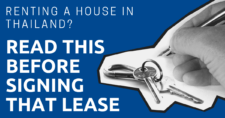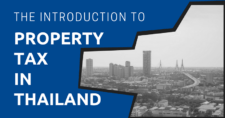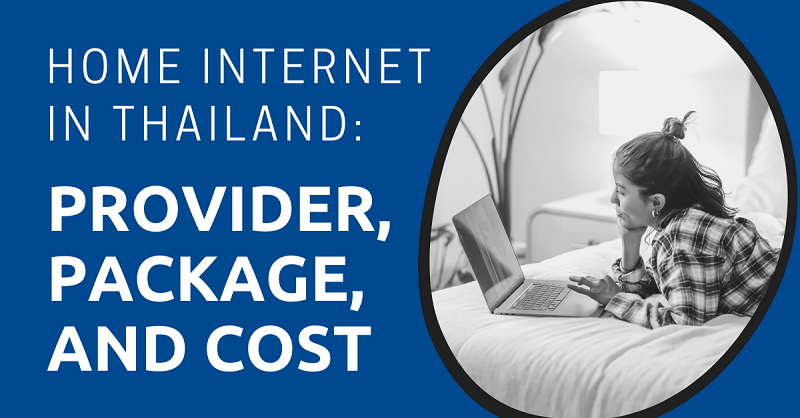
You’re probably dealing with the same challenges all expats face when signing up for home Internet in Thailand.
Providers demand documents you don’t have. You have to sign up for a 12-month contract when your visa situation is uncertain. And some packages have hidden costs that seem designed to trap you.
Choosing a home Internet provider in Thailand can be challenging, especially when you’re trying to figure out which promotional rates are real and which requirements you can actually meet as a non-Thai resident.
This guide cuts through the confusion by showing you exactly which documents you need, how to avoid contract traps, and which providers offer the best combination of speed, stability, and expat-friendly service.
I won’t be diving too deeply into mobile Internet in this guide. For more on that topic, check out our guide on choosing a Thai SIM card.
Want More In-Depth Advice?
If you want to get insider information on this topic, please subscribe to ExpatDen Premium. With it, you get access to hundreds of tips to help you move to Thailand comfortably while saving money at the same time.
We also have specific tips on:
- How to Be Hassle Free with Utility Payment by Automating Them All.
- How to Choose the Right Internet Providers in Thailand
- How to Get Free Yet Fast Wifi in Thailand
- How to Get Unlimited Internet for Your Phone in Thailand
- How to Save Over 50% on Your Thai Cell Phone Plan
- And Much More.
"*" indicates required fields
Disclaimer: This article may include links to products or services offered by ExpatDen's partners, which give us commissions when you click on them. Although this may influence how they appear in the text, we only recommend solutions that we would use in your situation. Read more in our Advertising Disclosure.
Contents
(And How It’s Costing Them)
Most expats throw money away, get lost in red tape, and miss the local hacks that make life easier and cheaper. ExpatDen Premium gives you the secrets seasoned expats use to save, earn, and thrive beyond the basics, saving you thousands and opening doors you didn’t even know existed.
Here’s what’s inside:
- Housing Hacks: Slash your rent by 40% or more - because the locals are laughing at what you’re paying.
- Banking Mastery: Stop wasting on fees and get top exchange rates. Why give your money away?
- Healthcare for Local Prices: Quality treatment without the expat price tag.
- Visa and Legal Shortcuts: No more bureaucratic nightmares. Get the visa and residency secrets that others pay their lawyer dearly for.
- Deep Discounts: Find the savings locals rely on for groceries, dining, and more.
If you’re serious about making Thailand work for you, join ExpatDen Premium and make Thailand work for you.
Key Takeaways
- Home Internet in Thailand uses fiber-optic systems, making it very fast and stable.
- You can expect to pay 599 THB a month for home Internet in Thailand, with an Internet speed of 500 Mbps for both upload and download.
- AIS and True are the two biggest providers, offering good coverage throughout the country.
- 3BB, another big Internet provider, offers good value packages, but their coverage is limited to certain areas only.
- Home Internet packages in Thailand come with a minimum one-year contract and normally include an installation fee and a router.
- Many Internet packages come with additional add-ons, including TV packages, home Internet, security cameras, and free public WiFi.
- Since most packages offer similar prices and speeds, you can look at add-ons to find the best plan for you.
Coverage
Fibre-optic Internet accounts for around 95 percent of all home Internet connections, with everywhere but a few remote rural pockets able to access it.
This means that unless you live in a very remote area, there shouldn’t be a problem installing an Internet at your place.
Speed and Stability
The Internet in Thailand tends to be fast and stable enough to make it a tempting hub for digital nomads. Home Internet packages start at 500 mpbs/500 mpbs download/upload speeds.
According to Speedtest, the Internet speed in Thailand has been ranked within the top ten worldwide for many years. For the purpose of this article, I performed an Internet speed test from within Bangkok using AIS fiber at three different times of the day and got these numbers:
- 9 AM: Download 319.31 Mbps | Upload 200.46 Mbps
- 12 PM: Download 317.71 Mbps | Upload 288.33 Mbps
- 7 PM: Download 313.90 Mbps | Upload 206.26 Mbps
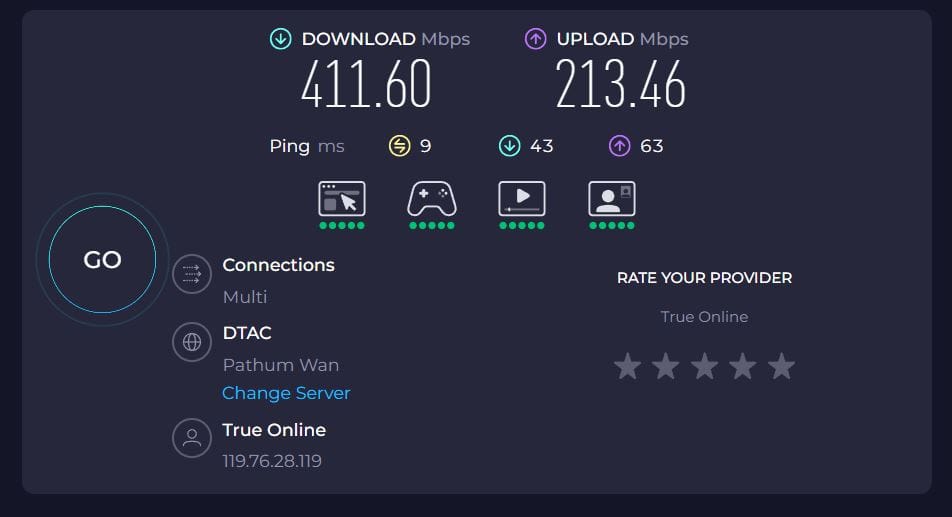
When it comes to stability, it’s very stable. From my personal experience living in Thailand for almost a decade, I can confirm that it’s very rare indeed for a connection to drop.
Thailand Internet Costs
All price comparisons in this section are based on standard residential packages available to all expats.
Home broadband packages from the Big Three start from around THB599 per month, ranging up to THB1299 per month, depending on what you need.
However, the best value package is likely that offered by TOT, who offer a (fairly basic) package for just THB300 per month.
Internet Providers in Thailand
Thailand’s largest and most popular Internet providers are AIS, True, and Dtac, also known as the “Big Three.”
These Internet providers are licensed and regulated by the National Broadcasting and Telecommunications Commission (NBTC), ensuring service standards and consumer protection.
You can find their branches in just about any of the country’s malls, or their SIM cards filling the shelves of your nearest 7-ELEVEN.
However, they aren’t the only game in town – smaller companies like 3BB and TOT also offer competitive packages. Let’s run through each provider offers:
AIS
AIS (it stands for Advanced Info Service, in case you were wondering) is Thailand’s largest mobile phone operator, with around 40 million customers.
AIS is currently leader of the pack in many areas – fastest connections, widest coverage (AIS mobile users can get a 5G signal most of the time), greatest stability and most widely-available public wi-fi. However, they can be a little pricier than their competitors.
AIS offers both mobile Internet packages and home fibre Internet, as well as a host of other services including payment processing (under the mPay brand), wi-fi hotspots and multi-platform entertainment (AIS Play).
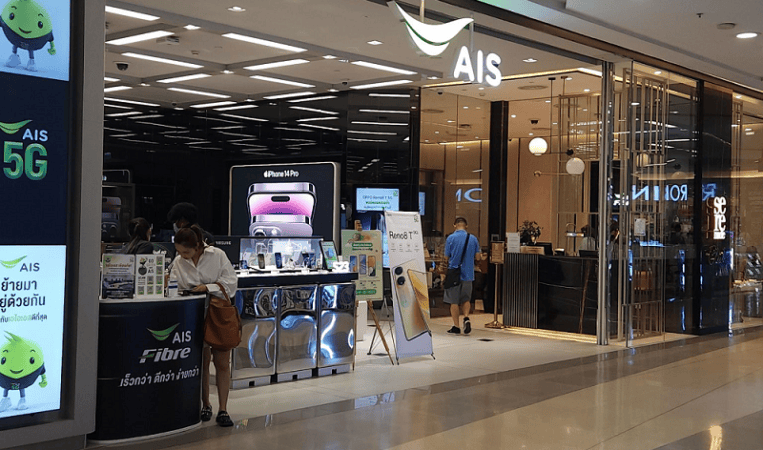
AIS’s Package starts at THB599 per month for download/upload speeds of 500 Mbps/500 Mbps.
However, professionals may want to consider the Serenade package, which offers a max download/upload speed of 1.5Gbps/500 Mbps for THB1099 per month, plus other goodies.
All of AIS’s Fibre packages are also capable of supporting Internet TV, home phone lines and security cameras amongst others.
True
True is an enormous communications conglomerate, covering everything from mobile Internet to coffee shops and shopping malls. Their cable TV service, TrueVisions, is the country’s largest and their mobile service (TrueMove H) is second only to AIS in size.
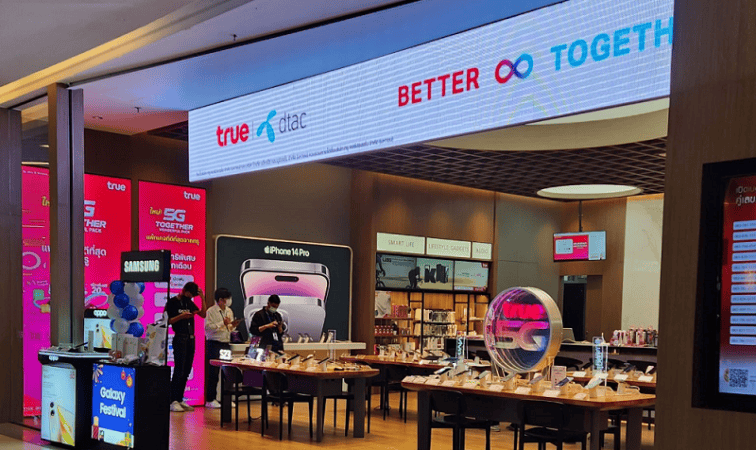
True offers home fiber Internet through the Gigatex ProLife brand. Their packages start at THB599 per month for download/upload speeds of 500 Mbps/500 Mbps (reduced to THB399 per month for TrueMove H customers), going up to THB1399 per month for download/upload speeds of 2 Gbps/500 Mbps, with a bunch of other goodies such as Premier League matches and TrueVisions cable thrown in to sweeten the deal.
True’s packages provide more bang-for-your-buck than AIS, and they also tend to sweeten the deal with the most extensive add-ons (SIM cards, subscription TV packages etc).
However, they are edged out a little by AIS in terms of speed, stability and coverage.
Dtac
Rounding out the Big Three is Dtac. Officially trading under the slightly less-snappy name of Total Access Communication Public Company Ltd., Dtac’s logo will be familiar to Scandinavians as that of Norwegian phone company Telenor.
This is no coincidence, as Telenor previously both directly and indirectly owned Dtac. However, right now True has already taken over Dtac, making it one-half of the largest mobile network providers in Thailand. But the two companies must operate separately until 2026, per NBTC regulations.
Traditionally a mobile company, Dtac got into the home Internet game fairly recently with their Dtac@Home scheme, which essentially sets you up with a 4G router at home. Packages begin at THB399 per month for a basic 100GB, rising up to THB899 for 500 GB.
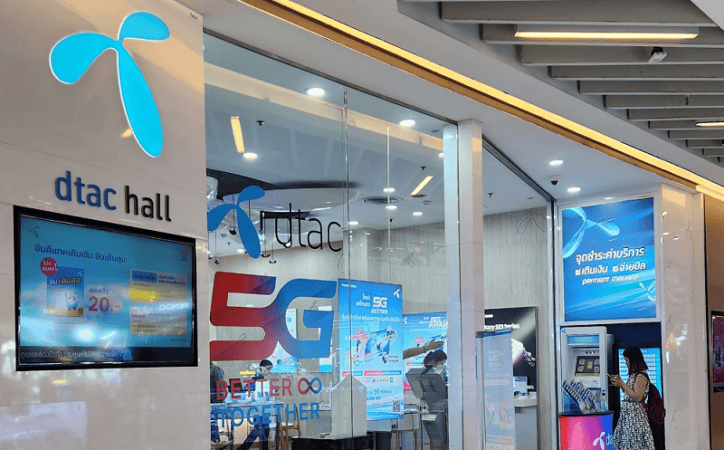
However, it’s not a fiber Internet. So, the speed can be quite low at 10 Mbps to 20 Mbps.
On the plus side, Dtac@Home is a neat way of getting a solid Internet connection without having to rely on fiddly cables. However, it might be a little too slow for those who need fast Internet for gaming or streaming.
3BB
3BB has been around for a long time, once trading under the name TT&T. They’ve been offering competitive home Internet packages since 2009.
While not quite up to the standards of the Big Three, 3BB still boasts extensive network coverage across the country.
3BB offers home Internet under the Giga Fiber brand. Packages begin at 1 GBPS/100 Mbps download/upload speeds for a reasonable THB590 per month, rising up to THB1200 per month for 1 Gbps/1 Gbps download/upload speeds for serious users.
Whilst 3BB are an economical choice compared to their competitors, their coverage is currently a little lacking compared to the Big Three.
TOT
Thailand’s state-owned telecommunications company TOT also offers some decent home Internet packages. Possibly the oldest company in this list, TOT dates all the way back to 1954 – although it’s fair to say their Internet wing is a little more modern.
TOT’s home fibre packages start at THB690 per month for 600 Mbps/600 Mbps download/upload speeds, topping out at THB900 per month for 1000 Mbps/1000 Mbps download/upload speeds.
Be warned, however – being a state-owned company, they are not used to providing service to expats. So, their staff might not be able to speak English well. Service can also be lacking compared to other private Internet companies.
Internet Packages
Not sure which package is for you?
Here we’ll break down the fibre packages each provider offers and the cheapest available package at that speed, as well as what extra add-ons you can expect with each.
Package Comparison
Prices shown are on a per-month basis. We’ve decided to leave Dtac off the chart because they do not currently offer fibre Internet.
| Download/Upload | 400/400 Mbps | 500/500 Mbps | 1 Gbps/500 Mbps | 1 Gbps/1 Gbps |
| AIS | – | THB599 | – | THB899 |
| True | – | THB599 | – | THB799 |
| 3BB | – | THB500 | THB699 | THB999 |
| TOT | THB490 | – | THB590 | – |
*This is the standard price as of July 2025. However, the final price can vary depending on the promotion you get.
Add-Ons
The bigger providers will frequently bundle their Internet packages in with a bunch of extras to entice you to buy. By bundling several services together, you can often reduce the cost of paying for each service separately.
However, the downside is that once you’ve signed up for one of these subscriptions it can be a pain to cancel it.
Some common add-ons include:
TV
Many Internet providers offer TV packages as an additional add-on.
- True’s Internet packages regularly come with a TrueID TV box. This may include just the basic channels or the full package – with extras such as Premier League games – depending on how much you’re willing to pay for your subscription.
- AIS also offers their AIS Play streaming service as an add-on to some of their packages, which includes channels such as Paramount, CNN and Nickelodeon. Some packages also include the Disney Plus streaming service, which is a big draw for many.
- 3BB’s Giga TV Package comes with a cable box and a subscription to HBO Go.
SIM Cards
Almost all of True’s Internet packages come with a free 4G/5G SIM card for a flat-fee per month – some even come with two! Many of AIS’s packages also contain an AIS SIM card – for example, the AIS Power Advance 4 Package comes with a 5G SIM.
Free Wi-fi
Some providers offer wi-fi connections in many public spaces for their customers, such as in malls or chain restaurants.
You can get a password as part of some of their packages – simply log-in wherever you see it offered.
Currently AIS offers the most extensive free wi-fi package.
Installing Home Internet in Thailand
Once you’ve chosen your provider, it’s time to get your Internet installed. Almost all the providers mentioned above will have branches in most of the country’s bigger malls, and these branches will usually have English-speaking staff so it’s simply a case of showing up and asking.
For most providers, you’ll need to show:
- Evidence that you’re staying in Thailand long-term (e.g a passport with a Non-Immigrant visa and/or work permit) if you wish to have the account fall under your name.
- You may also have to show a copy of your house registration book (tabien baan) and/or your current rental contract, depending on the provider.
Once you’ve signed up for a package, installation is usually fast and professional – the whole process of setting up the Internet at home should take within a few days. (In my case, True took just two days for the installation).
Some providers may ask for a one-off installation fee or deposit at THB2,000 to THBB3,000. The modem is often provided for free if you stay with them for at least 12 months.
Internet Contracts
Minimum contracts are often a year, so providers like to see some evidence that you’re not going to drop off the face of the earth before your contract is up.
If you cancel the contract before the minimum duration, many providers charge a cancellation fee of THB3,000 to THB4,000.
Alternative Options
If setting up a router at home isn’t an option for you, there are alternatives. These include:
Phone Data
5G was rolled out back in 2020, and now covers over 90 percent of the country – about the only places you can expect a drop in service are in some of the more remote national parks.
Because of this, mobile data is quickly becoming fast enough to cover all your basic Internet needs.
SIM cards with mobile data from the ‘Big Three’ providers (AIS, True and Dtac) range from just THB49 up to THB1500 per month, depending on the package you want.
These same providers also offer a number of pre-paid tourist SIMs of similar price, which are available in most larger 7-ELEVENs. These are inexpensive pay-as-you-go SIMs which last for a short set time (say around 7 days), which should be more than enough if you’re just here for a holiday or need something to tide you over while you wait for a home connection.
AIS provides the best coverage at present, with users able to access a 4G connection in Thailand 93 percent of the time, with TrueMove coming in second.
Public Wi-Fi
Most restaurants, coffee shops, bars etc. will provide a free wi-fi connection, particularly the big chains such as Starbucks – although do note that due to Thai legal requirements you frequently have to register first.
Wi-fi is a little less common in public spaces such as malls or train stations. The bigger airports such as Suvarnabhumi offer free wi-fi for a limited time only (normally around two hours), but it’s less common at smaller regional airports.
Most trains or buses do not currently provide wi-fi, so you’ll have to rely on your data while travelling.
But when you use public wi-fi, you should be careful of digital security. You definitely do not want to connect to your confidential data such as mobile banking when connecting to public wi-fi.
Adding additional protection with a VPN is also a good idea.
Read more: The Complete Guide To Picking The Best VPN For Thailand
Pocket Wi-Fi
You might see these little gadgets available at airport phone shops. As the name suggests, Pocket Wi-fi devices are small (pocket-sized, even) devices which provide you with a 4G wi-fi signal.
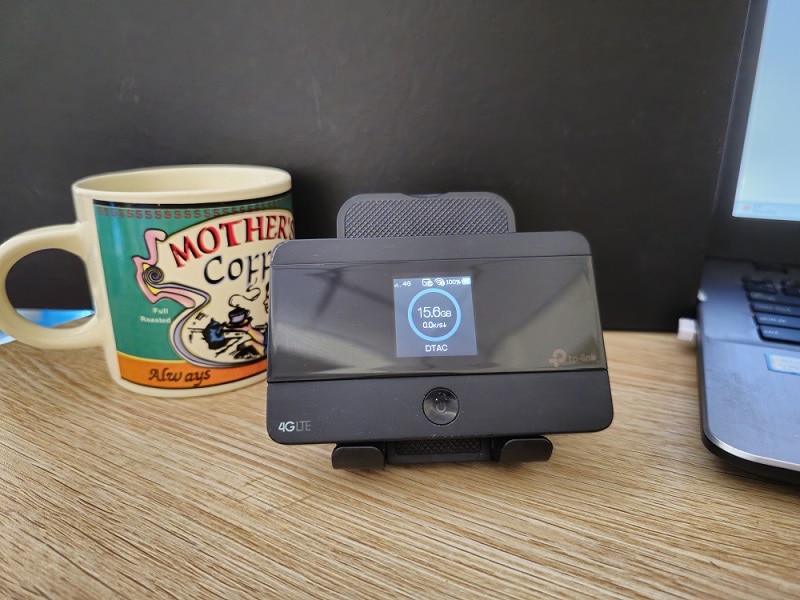
These are normally rented out rather than sold, as the initial outlay is a little too much for most casual travellers (around THB3000).
Ultimately, we can’t really recommend getting a pocket wi-fi device. Not only are they adding unnecessary weight to your pockets, they also tend to be more expensive on a per-day basis than a simple SIM card would be.
However, if your roaming plan is less-than-ideal and you can’t switch out your SIM card, it may be a potential option.
Satellite Internet
If you’re planning to live in a remote area, satellite Internet may be an option. Thaicom is one of the bigger providers, offering 30 Mbps of download speed via the IPSTAR satellite broadband network.
It’s expensive at the moment. A basic package costs THB1900 per month for 10/2 Mbps.
It goes without saying that you’re unlikely to get lightning-fast speeds via satellite, and it’s only really practical if you plan to stay somewhere without mobile or fibre coverage (and that’s a vanishingly small part of Thailand, as any coverage map will reveal).
Some Potential Downsides with Thailand’s Internet
Thailand’s Internet is generally excellent, but there are some things you should be aware of when it comes to getting home Internet.
- Contracts: Almost all providers lock you into a minimum 12-month contract, and if you need to cancel early, expect to pay fees ranging from THB3,000 to THB4,000. This can be frustrating if you’re an expat who might need to relocate for work or if you’re simply unhappy with the service. Some providers also require you to return their equipment in good condition, or you’ll face additional charges.
- Installation delays: While installation in Bangkok or other major cities is typically quick (I’ve seen it done in as little as two days), it can take longer in rural areas. You might find yourself waiting weeks rather than days, especially if infrastructure needs to be upgraded in your area. This is particularly true for newer developments or areas where fiber hasn’t been fully rolled out yet.
- Language barriers: This varies dramatically between providers and even between different branches of the same company. While malls usually have English-speaking staff, smaller neighborhood offices might not. Technical support over the phone can be challenging if you don’t speak Thai. TOT, being state-owned, tends to have the most limited English support, while AIS and True generally do better in this regard.
- Price increases: Those attractive promotional rates you see advertised often last for the first six to 12 months of your contract. After that, you might find your monthly bill jumping by THB200 to THB300 or more. Always ask what the regular price will be after any promotional period ends.
Despite these minor considerations, Thailand’s Internet is one of the best in Southeast Asia, and most of my expat neighbors find the service reliable.
Next Steps
All things considered, AIS are currently the market leaders when it comes to the Internet in Thailand. They boast the fastest speeds, most extensive coverage and the best value-for-money.
However, other companies such as True might have the edge when it comes to add-ons, particularly the TV packages.



